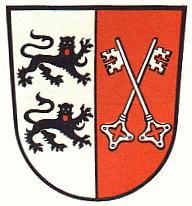Öhringen (kreis): Difference between revisions
Jump to navigation
Jump to search
Knorrepoes (talk | contribs) m (Text replace - "]]]" to "]]") |
Knorrepoes (talk | contribs) m (Text replace - "[[Literature" to "{{media}} [[Literature") |
||
| Line 16: | Line 16: | ||
The largest part of the district belonged in the 12th and 13th centuries to the County of Hohenlohe, which is symbolised by the two lions of Hohenlohe in the right half of the arms. The keys symbolise the powerful Abbey of Öhringen, that held many goods in the district. | The largest part of the district belonged in the 12th and 13th centuries to the County of Hohenlohe, which is symbolised by the two lions of Hohenlohe in the right half of the arms. The keys symbolise the powerful Abbey of Öhringen, that held many goods in the district. | ||
{{media}} | |||
[[Literature]] : Stadler, K. : Deutsche Wappen - Bundesrepublik Deutschland. Angelsachsen Verlag, 1964-1971, 8 volumes. | [[Literature]] : Stadler, K. : Deutsche Wappen - Bundesrepublik Deutschland. Angelsachsen Verlag, 1964-1971, 8 volumes. | ||
Revision as of 10:32, 9 July 2014
| Heraldry of the World Civic heraldry of Germany - Deutsche Wappen (Gemeindewappen/Kreiswappen) |
ÖHRINGEN (ÖHR)
State : Baden-Württemberg
Incorporated into : 1972 Hohenlohekreis
Origin/meaning
The arms were granted on November 22, 1954.
The largest part of the district belonged in the 12th and 13th centuries to the County of Hohenlohe, which is symbolised by the two lions of Hohenlohe in the right half of the arms. The keys symbolise the powerful Abbey of Öhringen, that held many goods in the district.
Contact and Support
Partners:
Your logo here ?
Contact us
© since 1995, Heraldry of the World, Ralf Hartemink 
Index of the site
Literature : Stadler, K. : Deutsche Wappen - Bundesrepublik Deutschland. Angelsachsen Verlag, 1964-1971, 8 volumes.











